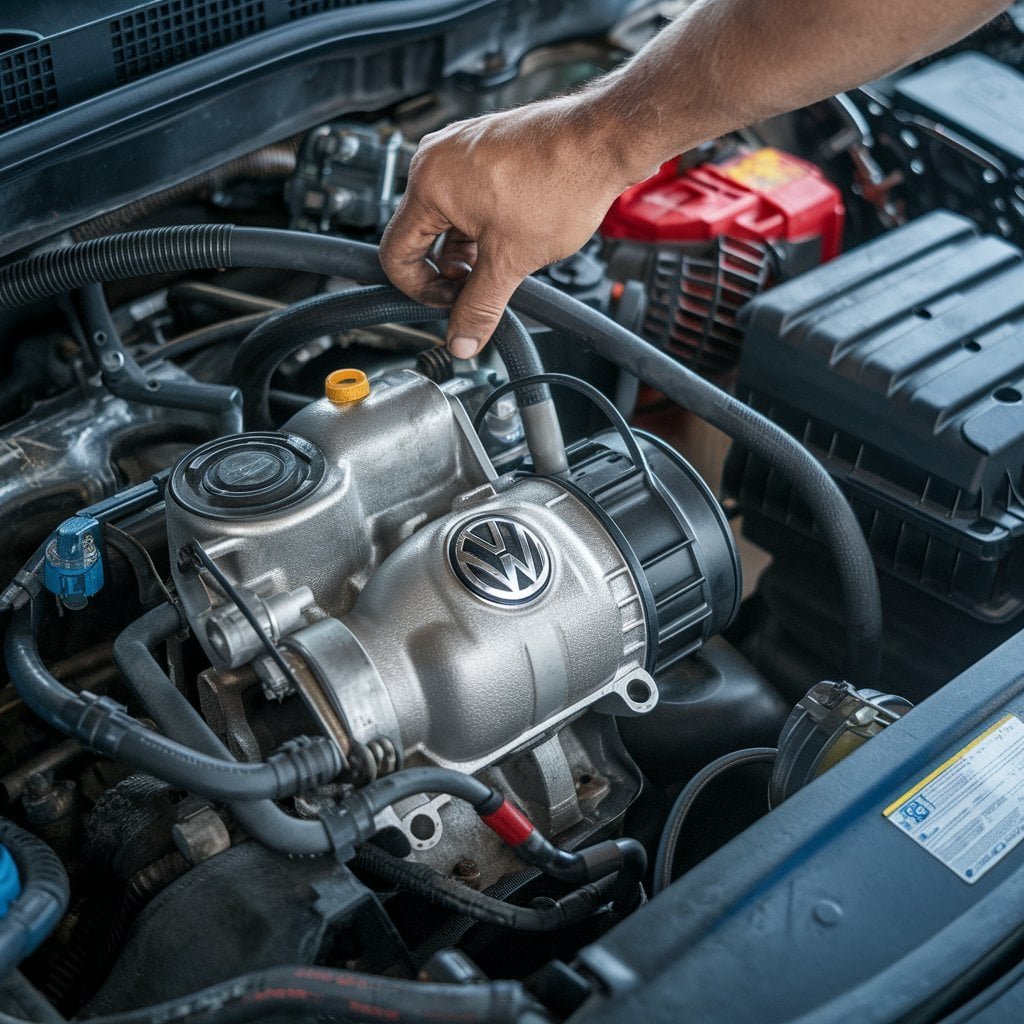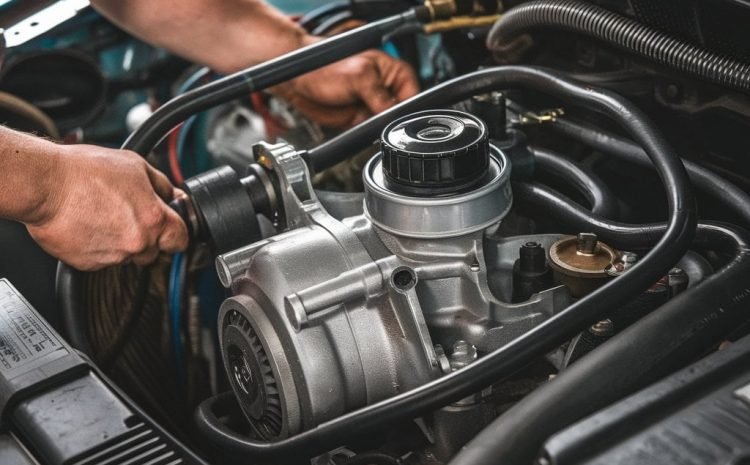Is your VW Passat’s power steering feeling stiff or making a whining noise when you turn the wheel? These are signs that your VW Passat power steering pump replacement is overdue. A failing pump reduces hydraulic pressure, making steering difficult and unsafe. Most Volkswagen Passat power steering pumps last around 100,000 to 150,000 km, but leaks, contamination, or belt issues can cause early failure. Ignoring it can damage the steering rack, hoses, and fluid reservoir, leading to costly repairs. At our Volkswagen repair center in Dubai, we offer expert VW Passat power steering pump replacement using genuine OEM parts to restore smooth handling. Book now and get a 15% discount on your VW power steering repair before the issue worsens!
The VW Passat power steering system has evolved over different generations, incorporating hydraulic, electro-hydraulic, and fully electric power steering pumps to enhance steering precision and efficiency. Each type operates differently based on technology, fluid requirements, and integration with modern driving assistance systems.
The hydraulic power steering pump (HPS) is the traditional steering assist system used in VW Passat B5 (1996-2005), B6 (2005-2010), and some early B7 models (2011-2015). This system relies on hydraulic pressure to reduce steering effort, making it smoother and more responsive.
The electro-hydraulic power steering pump (EHPS) was introduced in VW Passat B7 (2011-2015) as a transition between fully hydraulic and electric power steering systems. It retains hydraulic fluid for steering assist but replaces the mechanical belt-driven pump with an electric motor-powered pump for improved efficiency.
Starting from VW Passat B8 (2015-present), Volkswagen replaced hydraulic power steering with a fully electric power steering (EPS) system. Unlike previous hydraulic-based systems, EPS eliminates the need for power steering fluid and operates entirely on electronic sensors and motors.
A VW Passat power steering pump plays a crucial role in maintaining smooth and effortless steering. When it starts to fail, specific warning signs appear, indicating the need for immediate inspection or replacement. Ignoring these symptoms can lead to steering failure and expensive repairs. Here’s what to watch for:
A high-pitched whining or squealing sound while steering, especially at low speeds, indicates the power steering pump is struggling to circulate fluid properly. This could be due to low fluid levels, air bubbles, or internal pump wear.
If the steering wheel feels heavy or stiff, especially when maneuvering at slow speeds or parking, the pump may not be generating enough hydraulic pressure to assist in turning.
A bad power steering pump can develop seal failures, causing fluid leaks near the front of the vehicle. If fluid levels drop too low, the pump can overheat and fail completely.
If the fluid in the reservoir looks milky, bubbly, or dark, it means air or contaminants have entered the system, which can cause pump damage and reduced steering performance.
The steering response may feel uneven, with moments of smooth turning followed by sudden resistance. This happens when the pump fails to maintain steady hydraulic pressure.
A damaged power steering pump can cause fluid overheating, producing a burning odor due to excessive friction and internal component failure.
If your VW Passat power steering pump is showing any of these signs, getting it checked and replaced early can prevent steering failure and costly damage to the steering rack, hoses, and fluid reservoir.

A VW Passat power steering pump replacement is necessary when the pump stops working. Here are the most critical causes of failure:
Ignoring these issues can lead to steering rack damage and expensive repairs. If you notice stiff steering, whining noises, or fluid leaks, get a VW Passat power steering pump replacement before it worsens.
A failing VW Passat power steering pump might seem like a minor issue at first, but if left unchecked, it can lead to expensive repairs. The power steering pump is essential for maintaining smooth steering, and when it malfunctions, other steering system components suffer. Replacing it early prevents costly damage to the steering rack, fluid reservoir, and power steering hoses. Here’s how ignoring the problem can quickly escalate repair costs:
Without proper hydraulic pressure, the steering rack and pinion endure extra strain, leading to premature wear. A full steering rack replacement is far more expensive than a VW Passat power steering pump replacement.
A damaged power steering pump can release metal debris into the fluid system, damaging the steering control valve, hoses, and seals. Contaminated fluid requires a full system flush or replacement, increasing repair costs.
A failing pump struggles to circulate fluid properly, causing overheating. If the pump seizes, the steering wheel can lock up, creating a serious safety hazard that may lead to emergency breakdowns and costly repairs.
Pressure fluctuations from a failing power steering pump can cause cracks in hoses and fluid leaks, leading to low fluid levels. This increases strain on the entire steering system, potentially requiring multiple component replacements.
A timely VW Passat power steering pump replacement prevents steering failures, costly damage, and unsafe driving conditions. If you notice whining noises, stiff steering, or fluid leaks, schedule a replacement before minor issues turn into major expenses!
Replacing the power steering pump in your Volkswagen Passat is essential for maintaining optimal steering performance.In Dubai, the cost of this service varies based on factors such as the model year, type of pump (OEM or aftermarket), and labor charges. Below is a detailed breakdown of the estimated costs:
For a personalized consultation and to schedule your VW Passat power steering pump replacement, please contact us today. Our team is dedicated to providing exceptional service, ensuring your vehicle remains in optimal condition.
Book your VW Passat power steering pump replacement in Dubai with our expert technicians for a smooth and safe drive. If your steering feels stiff, makes whining noises, or leaks fluid, it’s time for a replacement. We use genuine OEM power steering pumps to restore precise handling and prevent costly damage. Our Volkswagen-certified specialists ensure a quick and reliable service with transparent pricing and no hidden fees. We offer same-day appointments, online booking, and WhatsApp support for your convenience. Get a 15% discount on your VW Passat power steering repair today. Call us now to schedule your service!

Trust our team of Expert Volkswagen Mechanics at our Volkswagen Service Center in Dubai for all your Volkswagen Repair and service needs.
Our Top-Notch Volkswagen Service Center in Dubai have the advanced diagnostic tools and Volkswagen experts to accurately identify and resolve any issues with your Volkswagen.
With over 1200+ Volkswagen repaired, our Volkswagen Service Center in Dubai is the trusted Garage for comprehensive and expert Volkswagen Repair services.
Most of the vehicles get damaged just because of maintenance neglect you take
Driving with a failing power steering pump is risky and can cause steering stiffness, unpredictable handling, and safety hazards. A bad pump can lead to complete steering failure if it seizes or leaks excessively. It also puts extra strain on the steering rack and serpentine belt, leading to more expensive repairs. If you notice whining noises, stiff steering, or fluid leaks, schedule a VW Passat power steering pump replacement immediately.
A wheel alignment is not always required after a power steering pump replacement, but it’s recommended if you experience uneven steering response, drifting, or tire wear. The steering system and alignment work together, and any disruption in fluid pressure or steering assist can affect handling stability. Our technicians inspect and adjust the alignment if necessary to ensure smooth driving.
Using non-VW-approved power steering fluid can damage the power steering pump, hoses, and seals. Incorrect fluid may cause foaming, overheating, and loss of hydraulic pressure, leading to steering system failure. We always use manufacturer-recommended power steering fluid to maintain optimal performance and extend the lifespan of your steering components.
In most cases, replacing the VW Passat power steering pump is more cost-effective than repairing it. Pump components wear out over time, and attempting a repair may only offer a temporary fix. A new OEM or high-quality aftermarket power steering pump provides better reliability, prevents recurring failures, and ensures proper hydraulic pressure for effortless steering.
A power steering pump usually lasts between 100,000 to 150,000 km, but driving habits, fluid condition, and maintenance affect its lifespan. Regular fluid checks, avoiding steering overuse, and fixing leaks early can extend its durability. If you notice stiff steering, loud noises, or fluid discoloration, it’s time to consider a VW Passat power steering pump replacement.
Yes, a full power steering fluid replacement is recommended when installing a new power steering pump. Old or contaminated fluid can carry metal debris and dirt, damaging the new pump and other steering components. We always flush and refill the power steering system with VW-approved fluid to ensure smooth operation and long-term performance.
If your power steering fluid is low, refilling it may temporarily fix the issue. However, if you hear whining noises, feel stiff steering, or notice leaks, it’s likely a failing power steering pump. A professional diagnostic check will confirm whether a VW Passat power steering pump replacement is necessary or if a simple fluid top-up will solve the problem.
“Talk to a Volkswagen Expert Now by booking a call, and get personalised solutions for your Volkswagen unique needs and requirements.”
+971564646081
